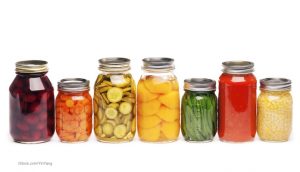The Oregon State Public Health Laboratory this week confirmed that three residents contracted botulism from home canned foods at a private barbecue. Since botulism is not spread person to person, there is no risk to the general public. All three people had to be hospitalized. Deschutes County Health Services, which conducted the investigation, is reminding consumers of the importance of following hygienic canning procedures to the letter. Your state extension service is an excellent source of information about this practice.
 The National Center for Home Food Preservation recommends the most current research-based metwhods for home food preservation. For instance, for low-acid foods such as green beans and meats, a pressure canner is needed. There are no safe boiling water canning options for vegetables, meats, seafoods, soups, and some food mixtures. That organization offers a free online course for consumers who want to can their own food.
The National Center for Home Food Preservation recommends the most current research-based metwhods for home food preservation. For instance, for low-acid foods such as green beans and meats, a pressure canner is needed. There are no safe boiling water canning options for vegetables, meats, seafoods, soups, and some food mixtures. That organization offers a free online course for consumers who want to can their own food.
Foods contaminated with botulinum toxin may not look, smell, or taste spoiled. To avoid botulism do the following: carefully follow rules when canning foods at home, do not eat foods from cans that are bulging or leaking, do not make flavored oils at home, potatoes baked while wrapped in foil should be kept hot until serving, Boil home-canned foods for 10 minutes before consuming
Botulism is caused by eating foods that contain the toxin produced by Clostridium botulinum spores. The symptoms include double vision, blurred vision, drooping eyelids, slurred speech, difficulty swallowing, dry mouth, and muscle weakness. If you or anyone you know experiences these symptoms, see a healthcare provider immediately.
Foodborne botulism symptoms usually begin 12 to 36 hours after eating food contaminated with the bacteria, but they can occur 6 hours after eating or as long as 10 days later. In the U.S., there are about 145 cases of botulism each year. Most of those are infant botulism; many of those cases are caused by feeding infants honey, which can contain spores of the bacterium.




